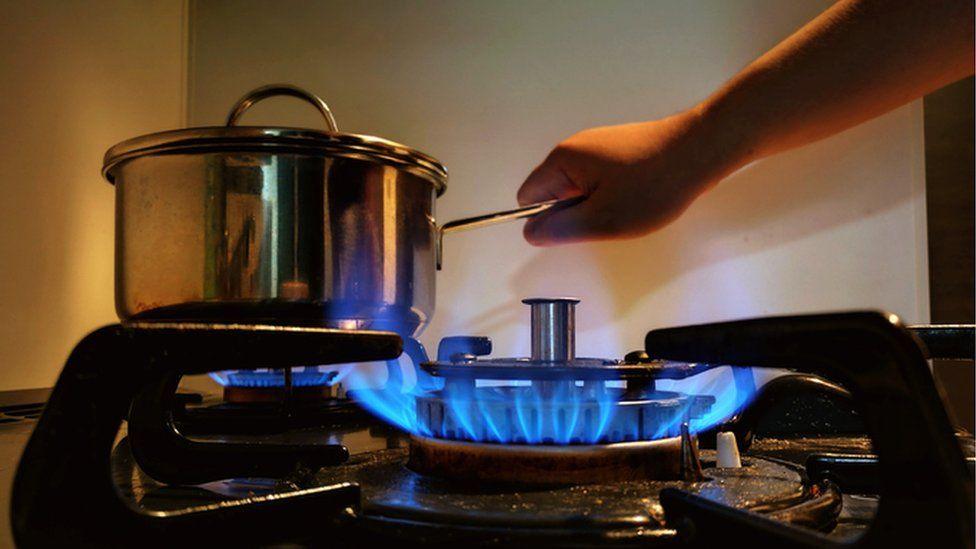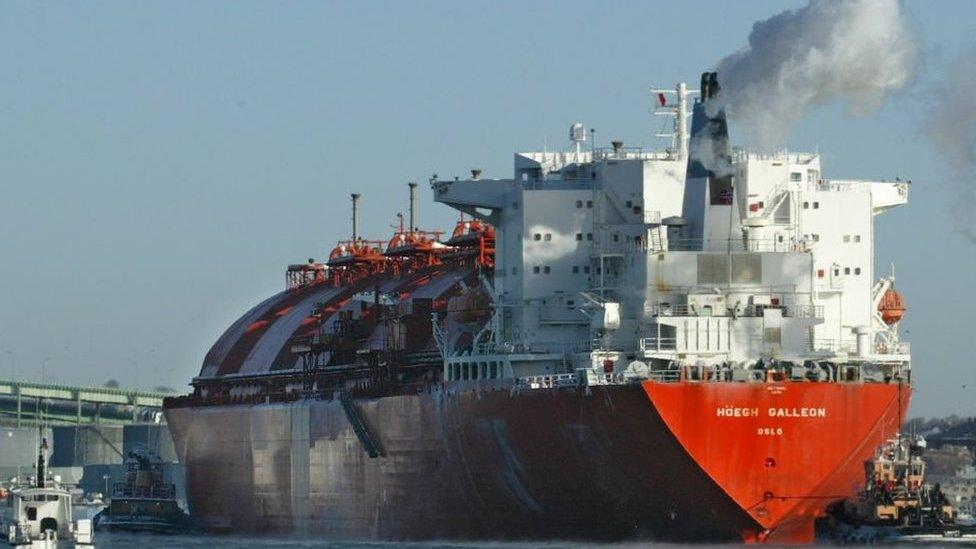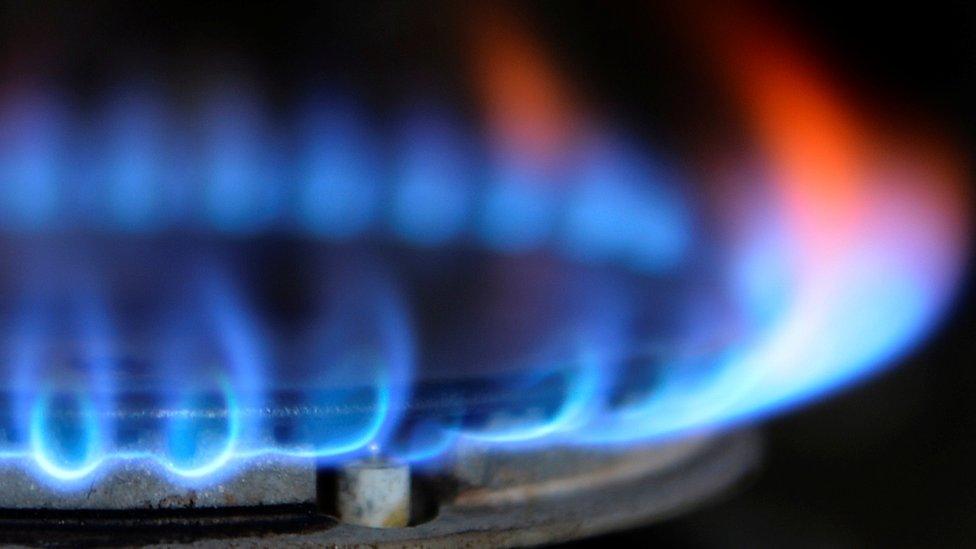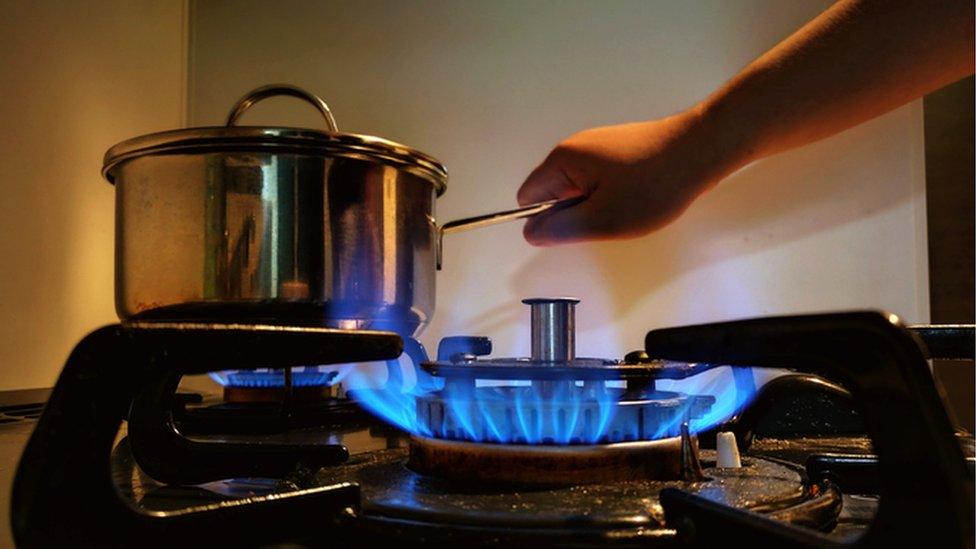Firmus increases prices across NI by 56.3%
- Published

Gas supplier Firmus Energy has announced a 56.3% price rise across both its networks in Northern Ireland.
The increase will affect about 62,000 customers in the Ten Towns area and 47,000 in Greater Belfast.
It is understood to be the biggest increase of any supplier in Northern Ireland to date and will take effect from 3 October.
The Ten Towns area includes Antrim, Armagh, Ballymena, Coleraine, Craigavon, Londonderry and Newry.
There the rise means the annual gas bill of a typical household will rise by about £847 per year. Customers with a prepaid meter will see their typical costs increase by around £806 per year.
In the Greater Belfast area the typical annual bill will rise by about £855, while those with a prepaid meter will see costs rise by about £843 a year.
The Treasury has confirmed there will be a £400 discount on energy bills but unlike the rest of the UK, it is not known when that support will reach people in Northern Ireland.
"It really is an eye-watering price increase" - Consumer Council
Raymond Gormley, head of energy policy at the Consumer Council, described the increases as "eye watering".
"We are facing into a very serious crisis this winter and we are angry and fearful on behalf of Northern Ireland consumers," he said.
"Until recent times, a household's typical annual bill was lower than the amount of this increase.
"Once this price rise takes place on 3 October, consumer bills will be around four times the norm."


Northern Ireland's energy regulator says the Firmus Energy rises mean some consumers in Northern Ireland will soon pay similar prices to consumers in GB, if its price cap increase goes ahead on 1 October.
John French says the combined regulated electricity and gas bill in the Northern Ireland Ten Towns area will be £3,150 a year from 3 October.
This compares to the price cap in Great Britain, where the combined electricity and gas bill for the average household will be £3,549 a year from 1 October.
However, the new prime minister seems to be aiming for a policy which will mean the GB price cap increase will not happen as planned.
It is understood that a typical energy bill in Great Britain could be capped at about £2,500 with full details expected on Thursday.
So people in Northern Ireland now need some urgent clarity about what will happen to their bills.
Will they increase sharply in 28 days time or will they not?
Read more here.

Mr Gormley said high prices in the energy market are likely to remain for the "foreseeable future".
He stressed that the price rises were not down to Firmus, but instead the wholesale price increases due to Russia's war in Ukraine.
"Russia have basically turned off the tap on Europe," he added.

'There's only so much you can save'

Megan Potts says her shopping bill has doubled
Mum-of-one Megan Potts lives in Bangor and she first spoke to BBC News NI a year ago about the rising cost of living.
Now she says although she already lives very frugally she is faced with rising gas, electricity and food bills and is worried about the winter months ahead.
"My food shopping is ridiculous, I used to be able to keep my food shopping to £40-50 for the two of us for two weeks," she said.
"I'm now spending £100 for two weeks and that's just mind-blowing to me - we aren't eating any more than we used to, it's just costing more.
"I don't run the heating. I shower a maximum of three times a week and just have a good scrub in between.
"I don't cook meals in the oven if I can help it. I've got a microwave, an air fryer and a camping stove - if I'm going to be boiling something for a long period of time I don't do it on the hob.
"There's only so much money you can save, once you've cut out the luxuries and you're left with basic necessities, where do you go from there?
"I know that I will stop eating before my daughter does - no matter what, she will continue to have food on the table."

Chief executive of Firmus Energy Niall Martindale said that increases in wholesale gas commodity costs "continue to impact the market".
"Regrettably, we have no choice but to reflect these increases in our tariffs," he added.
He said the ongoing war in Ukraine and Russian disruption to the supply of natural gas in Europe were having a significant and adverse impact on energy costs, affecting all suppliers in Northern Ireland, as well as nationally and internationally.
"We know this is not welcome news," he said.
"Tariffs are set as a direct consequence of wholesale prices on the global market and we have no option but to reflect the cost of this gas within our tariffs.
"We remain committed to reducing tariffs as soon as the market crisis subsides and enables us to do so."
Mr Martindale said it was a "very difficult time for many households and businesses" and urged any customers who need further support to call their local Firmus Energy team to discuss the matter.
Related topics
- Published26 August 2022

- Published1 June 2022

- Published5 April 2022

- Published31 March 2022
